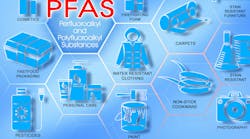• In the press release below, the environmental arm of law firm Weitz & Luxenberg expresses outrage regarding alleged groundwater contamination in North Carolina
NEW YORK, Nov. 6, 2007 -- It is an environmental tragedy that befalls people all across the country: corporations pollute groundwater with harmful chemicals, leaving in their wake communities that can't even drink from their own wells. This scenario is an all-too familiar one for many residents of Peachtree, North Carolina, who now know their groundwater is tainted by toxic industrial solvents.
"It's outrageous when the wells people rely on for the water in their homes are contaminated with toxic industrial chemicals because of negligence or indifference," stated Lem Srolovic, an attorney in the Environmental Toxic Torts Unit of Weitz & Luxenberg, P.C. "Dangerous chemicals such as those in the groundwater in Peachtree must be handled with utmost care. Unfortunately, all too often, that doesn't happen," Srolovic observed.
Weitz & Luxenberg, P.C. represents residents in several communities around the country for the personal injuries and property damage they have suffered as a result of groundwater pollution. The firm also represents over 70 water providers whose water supplies have been contaminated with MTBE, a man-made chemical that was added to gasoline and readily contaminates groundwater.
Frightened residents in the small town of Peachtree in Cherokee County have been warned not to drink, shower or wash their clothes in the water from their wells. Recent groundwater testing in the area detected levels of an industrial solvent 30 times higher than what is considered the safe drinking water standard, reported the Asheville Citizen-Times.
A site nearby on N.C. 141, now owned by Moog Component Group, has long been contaminated. The Environmental Protection Agency (EPA) now believes that contamination may be spreading into Peachtree. This discovery prompted defense contractor Northrop Grumman, the previous owner of the facility, to distribute bottled water to 11 residences, a community center and a church. Prior to that, all had been drinking from well water, said local newspaper Cherokee Scout.
The chemicals involved include trichloroethylene (TCE), used for cleaning metal parts, and tetrachloroethylene (PCE), used for metal degreasing. EPA has expanded water testing in the area to the south and east of the plant to identify how far those chemicals may have spread.
The trouble began in 1987, when the EPA first discovered toxins leaking from an underground storage tank into the water of residents living on the border of Slow Creek. At that time, the Moog site was owned by a plant that cleaned and serviced aircrafts, Clifton Precision, a subsidiary of Litton Industries. Northrop Grumman acquired Litton in 2001.
The EPA has scheduled two public meetings to address concerns regarding the Peachtree contamination:
Thursday, Nov. 8
2-4 p.m. and 7-9 p.m.
At the Peachtree Community Center
Weitz & Luxenberg, P.C. is one of the leading plaintiffs' litigation law firms in America. A forerunner in the legal fight against environmental polluters, Weitz & Luxenberg has worked with clients harmed by MTBE and other toxins.
###


